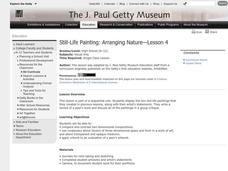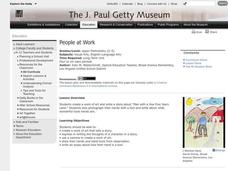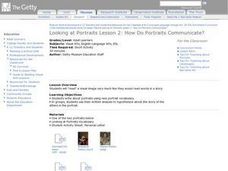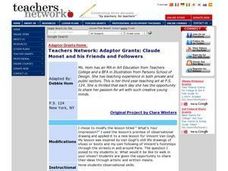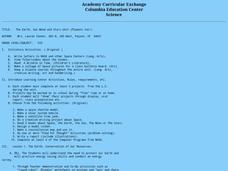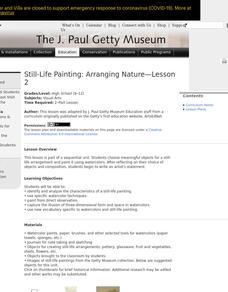Curated OER
Still-Life Painting: Arranging Nature
Students display the two still-life paintings that they created in previous lessons, along with their artist's statements. They write a review of a peer's work and discuss all of the paintings in a group critique.
Curated OER
Buildings, Buildings Everywhere
Young scholars gain awareness of shapes in architecture by creating a painting of their school and writing a reflective summary of their study of architecture.
Curated OER
People at Work
Students create a work of art and write a story about "Man with a Hoe Five Years Later." students also photograph their hands with a tool and write about what wonderful tools hands are.
Curated OER
You Be the Critic!
Students review several pieces of art and choose one that inspires them. They research the artist and his or her contributions to art and then recreate the artwork and compare their copy to the original.
Curated OER
Decorating Objects... and Re-decorating
Students create decorative objects and discuss their importance in form and function. In this art history lesson, students discuss Chinese porcelain objects with mounts later added by the Chinese. Students recreate an example of this art...
Curated OER
Exploring Photographs - Writing the Artist's Statement
Students read an artist's statement by Dorothea Lange and write a statement based on their own photographs. For this photograph and writing lesson, students examine the relationship between photography and the artist's statement....
Curated OER
How Do Portraits Communicate?
Students read a visual image very much like they would read words in a story. They write about portraits using new portrait vocabulary. They, in groups, use their written analysis to hypothesize about the story of the sitters in the...
Curated OER
The life of William Ah Ket - Building bridges between East and West
Students read the story of William Ah Ket, an Australian-born Chinese man who became a respected leader in the community in the early twentieth century. This story is used as the context for research, vocabulary development and creative...
Curated OER
Urban Concentration and Racial Violence
Students research one of the many urban race riots in U.S. history, from the New York City riots during the Civil War to the "Red Summer of 1919" or the hate-strikes of 1943. They present their findings in the form of a newspaper's front...
Curated OER
A Simulation of the Electoral Process and the Resulting House of Commons
Students engage in a lesson which give them the knowledge, skills and an appreciation for the electoral process and parliamentary system.
Curated OER
Reporting Live From...
Students examine the many disasters in West Virginia. For this US history lesson, students write about and give an oral presentation of one of the disasters as if they were reporters.
Curated OER
Discover the History of Melody
Students connect to music resources. In this music lesson, students visit the websites of the Handel House Museum, the Horniman Museum, Reid Concert Hall, and the National Center for Early Music. Students...
Curated OER
What's Your Impression
Young scholars examine the various artwork completed by Vincent Van Gogh. As a class, they are asked the question "What is it like to walk in your shoes?" They are to write a paper and draw their ideas to share with the class. They...
Curated OER
Getting to Know You
Students complete an getting to know each other activity. In this personal names lesson, students play a name game, read a book about names, and then discuss why names are important. Students design a name card on oak tag rectangles and...
Curated OER
Community Evolution: Putting the Puzzle Together
Pupils, working in groups, to study on aspect of their community history. They put their research together in one story about their community.
Curated OER
Pick a Picture
First graders practice recognizing words with the short /a/ sound and applying /a/ phoneme in spoken words. They interact with the book, "Pat's Jam," and five picture cards with pictures of a hat, rat, cat, pig and a dog on each one....
Curated OER
Rhyme Charades
Students participate in a game called "Rhyme Charades." The teacher thinks of a word to begin the charades game giving the clue "my word rhymes with ...". The students who have a guess stand in the middle of the circle and pantomine...
Curated OER
The Odyssey Plan
Ninth graders read and analyze The Odyssey. They apply note-taking skills to identify enemy, type of enemy, and traits demonstrated throughout the book. Students create a storyboard that illustrates the selected episode from the book...
Curated OER
Steve and Harriet's Wedding
Students identify the digraph /sh/ in written and spoken language. After a brief discussion the independent and combined sounds of the phonemes /s/ and /h/ students practice identifying initial and final placement of the new digraph /sh/...
Curated OER
Journalism: Following Your Lead
Students, in groups, identify the components of news article lead sentences. They visit other classrooms and take notes identifying the lead components on the lesson. Students search local and national newspapers for leads that grabbed...
Curated OER
Naper Settlement: Post Activity, Journal Entry
Fourth graders have to place themselves in someone else' shoes through journal writing. They place themselves in someone else' shoes through journal writing. Students write the journal entry to another student in the class or a...
Curated OER
Cracking Sticks
Students explore the letter /k/ in this lesson plan, and identify the /k/ sound in words. They read a tongue twister emphasizing the /k/ sound, and discuss that two letters make the /k/ sound - c and k. They then practice writing k's...
Curated OER
The Earth, Sun, Moon, And Stars
Fifth graders explore the solar system. In this solar system unit, 5th graders investigate numerous projects while rotating through learning centers. Students write about space and construct a space shuttle model. Students practice map...
Curated OER
Still-Life Painting: Arranging Nature—Lesson 2
Learners choose meaningful objects for a still-life arrangement and paint it using watercolors. After reflecting on their choice of objects and composition, students begin to write an artist's statement.


